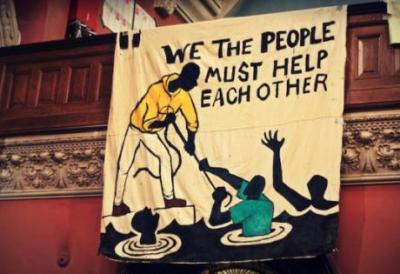Worker bees create buzz at BreadHive Worker Co-op

BreadHive's owners -- five women and one man, ages 25 to 31 -- share in the profits and operate without a hierarchical structure. Decisions are made by consensus at weekly meetings.

BreadHive's owners -- five women and one man, ages 25 to 31 -- share in the profits and operate without a hierarchical structure. Decisions are made by consensus at weekly meetings.
This paper focuses on the process of workers' self-management brought about by a wave of experimentation with alternative organizational forms taking place in Greece since the beginning of the current financial crisis. The discussion is supported by empirical evidence from qualitative fieldwork conducted in three workers' collectives.

Tens of thousands of people showed that we don’t need capital or governments to get things done. They demonstrated the will of people to take part in comforting each other, re-building, creating and moulding their own futures.

Fourteen miles from Winthrop, in Moltke Township, population 330, one soybean- and wheat-farming family reported its sluggish DSL connection often made it impossible to upload reports to business partners.
Maine’s economy faces a host of well-known challenges: reliance on natural resource extraction or low-quality service jobs, geographic isolation, challenging climate, and out-migration, especially of young adults. Staying on this course is undesirable, but traditional economic development fixes have had limited success.

ATTEND DAYS OF ACTION EVENTS: DC SCHEDULE

The Farmacy program has so far given 200 patients “prescriptions” that they can exchange for wooden tokens to buy produce at the market.
“A doctor tells someone, ‘You need to start eating more greens,’ but they say, ‘Well, I only get $122 a month in SNAP, I just can’t afford that stuff,’” Horn says. With the doctor’s prescription, now they can.
Collective housing, cultural co-ops, land trusts, community banks are community-rooted enterprises that empower those that have been excluded from traditional economic institutions. Solidarity economy models exercised throughout the country are becoming viable solutions towards sustainable and economically just living.
One possibility is to give people time in silence to contemplate what they've heard and what they'd like others to know about their thinking before calling for responses. To be clear, I'm not talking about slowing things down all the time; but it may be a better idea than I knew to do this regularly.